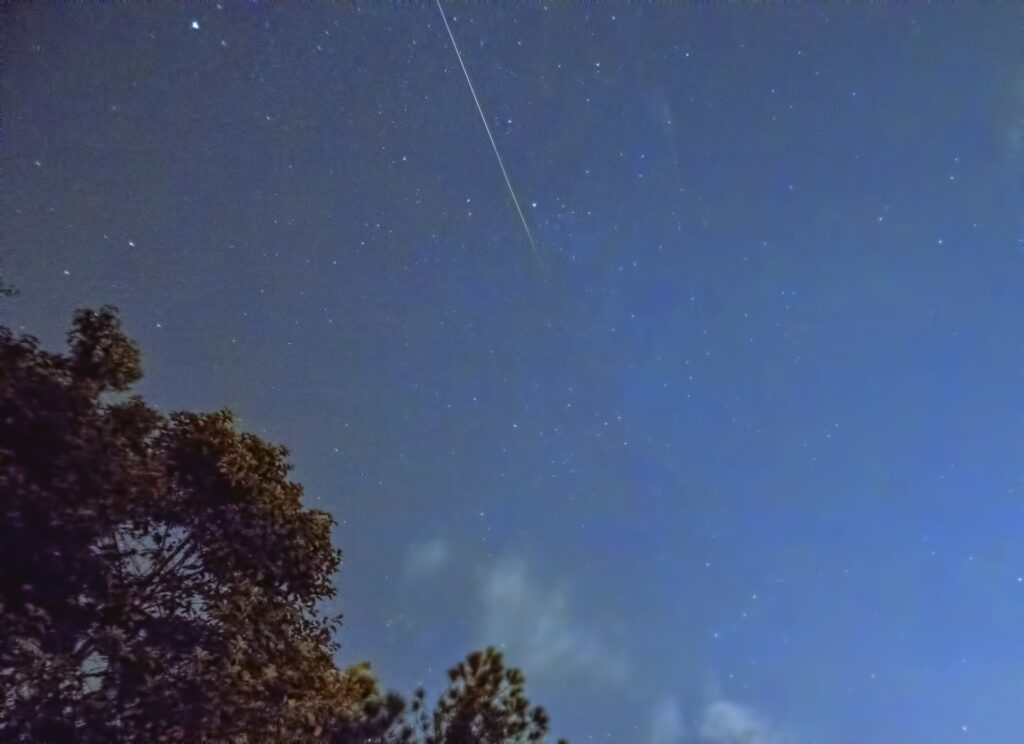How to view the 2023 Perseid meteor shower
By AMY SAYLE
CHAPEL HILL, NC (Aug. 2, 2023) — Have you spotted any Perseid meteors yet?
The annual Perseid meteor shower—considered by many to be the best meteor shower of the year—is already happening and is predicted to peak Saturday evening, August 12, 2023, into early Sunday morning, August 13. If the weather cooperates, you can join us at a free skywatching event that night at Dix Park in Raleigh.
Sometimes misleadingly referred to as “shooting stars,” meteors are the streaks of light you see in the sky when cosmic debris slams into Earth’s atmosphere. The Perseids are the result of dust left by Comet Swift-Tuttle on its periodic trips around the Sun.
In some years, the Perseids are somewhat spoiled by bright moonlight that washes dimmer meteors from view. Not this year, though. On the peak night, the Moon will be a fairly thin waning crescent, and it won’t rise until a few hours before sunrise.

Tips for viewing this year’s Perseids:
- Check your weather. The sky need not be perfectly clear, but you won’t see meteors if it’s completely overcast.
- Choose a location. Find a dark spot away from unshielded outdoor lights, if possible, and with an open view of the sky. If watching from outside your home, turn off your house lights. If you’d enjoy making meteor memories with a crowd, join Morehead educators, the Raleigh Astronomy Club, and the Chapel Hill Astronomical and Observational Society at Dix Park in Raleigh, on Saturday, August 12, 2023, between 9 and 11 p.m. There will be telescopes, swag tables, and tours of the night sky. This event is free. Please register online in advance.
- Choose a time and date. If you’re determined to see the most meteors, plan to go out later in the night rather than just after dark. During the pre-dawn hours, your side of Earth is leading in space and sweeping up the most meteors. But you can still expect to see some Perseids if you go out during the more reasonable evening hours on Saturday, August 12, 2023. You might even see a dramatic “earthgrazer”—a long, slow meteor. If you miss the peak night, try another night close by. This meteor shower started in the second half of July and will be active through August. Just don’t expect to see as many meteors if you look later in August.
- Get comfortable. Use a blanket, sleeping bag, or reclining chair to get a wide view of the sky without having to crane your neck.
- Look up! Obvious, right? Yet it’s surprisingly easy to miss meteors by looking at your friends or your phone. Your phone’s light will also hurt your night vision.
- You need only your eyes. A telescope’s restricted field of view is actually counterproductive for meteor viewing. But at the Dix Park event, we’ll have telescopes so you can observe other celestial delights, too.
- Don’t worry about knowing how to identify Perseus. The Perseids get their name from the constellation they appear to fly away from, Perseus, which lies in the northeastern sky in August evenings. But the meteors can appear anywhere in the sky.
- Adjust your expectations for your location. From a dark location far away from city lights, you might see more than one Perseid meteor per minute on average on the peak night. But don’t let an inability to get to a dark viewing site discourage you. The Perseid meteor shower is famous for producing fireballs—very bright meteors. At last year’s Perseid event at Dix Park, which suffers from quite a bit of light pollution, we were able to spot a number of meteors over the evening.
- Be patient. Plan on being outdoors for more than just a few minutes. Your eyes need time to adjust to the dark, and the meteors can come in clumps.
To learn more about Morehead skywatching programs and to download our current star map, see Morehead’s skywatching page. We hope to see you at Dix Park on Saturday, August 12, or at another skywatching event this fall!
